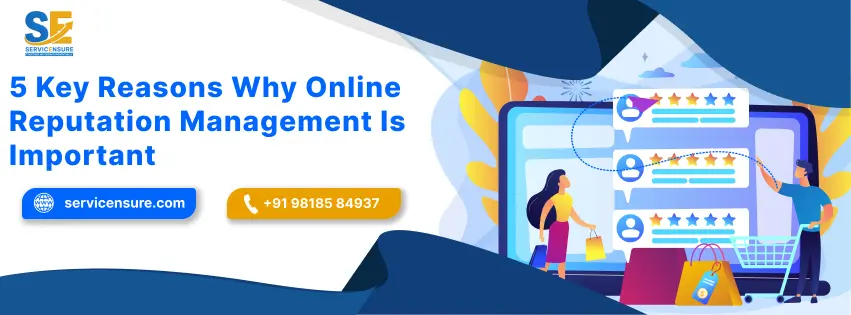When you take your services or products online, people will inevitably talk, post, and comment about them. These conversations are not one of those you can turn a blind eye to, as they will have a direct impact on your business. As a result of this, maintaining a positive online reputation has become more essential than ever. Amongst other methods for this process, the best one proves to be social media reputation management. In this article, we will discuss the role of reputation management via social media and how it can assist you to achieve your desired business goals.
What Exactly Is Social Media Reputation Management?
Managing reputation via social media is one of the core practices of ORM, and is done to monitor, manage, and influence the image of your brand across various social media channels. In case the reputation is left unchecked, then there are good chances that the reputation is going to run off course, which leads towards your desired goals.
Regardless of your participation, conversations online are going to happen, and some of them may even involve your business. Furthermore, a majority of consumers are likely to engage with a business that has a good social media platform. This means that with effective management of social media reputation, you can attract customers and foster a sense of loyalty around your brand, and can make every interaction an opportunity to strengthen your relationship with the audience.
The Role of Social Media In Reputation Management
The role of social media in reputation management is to serve as a direct channel where the public can interact with a business in real-time. Aside from managing or promoting the reputation, social media also plays a crucial role in mitigating the damage from a crisis. This is also among the major reasons why the top online reputation management company in Gurgaon uses this practice to build trust with the audience.
By using social media for reputation management, you can attain crucial information on how people are responding to your business. With this information at your disposal, you can pinpoint the current standing of your business and also improve your reputation to elevate visibility across social media platforms.
Mentioned below are a few benefits of using social media for managing the reputation of your business.
- Tracking Metrics: By using social media reputation management tools, you will be able to easily and effectively track all the data, as it will be centralized. Moreover, these metrics will also assist you in identifying the gaps and responding to customers’ feedback.
- Segmentation: One of the major benefits of monitoring the reputation of your brand with social media is that you will be able to create segments for specific categories. For example, you can divide your audience based on their interests, demographics, and behaviors.
- Competitor Analysis: In addition to managing reputation, social media platforms can also allow you to see how people are responding to your competitors. By analyzing the responses, you will be able to create strategies that can assist with your reputational management efforts.
- Engage With Customers: This does not mean publishing new content or implementing different strategies. Instead, it means responding to both positive and negative reviews from your audience. This will result in fostering a sense of loyalty around your business and assisting you to overcome the blockages of your social media reputation.

Best Tips For Social Media Reputation Management
The benefits of reputation management through social media are many, but you can only experience any of them with the correct planning and execution. Below, we have listed five key factors that you can consider to effectively manage and promote your social media reputation.
1. Analyze
In order to craft the perfect plan to improve your brand’s reputation, you will first need to check how your brand is actually perceived by the audience. This will include multiple factors, such as overall customer satisfaction and dealing with naysayers. These analytics will help you understand the current reputation of your business on social platforms.
Analysis of the data will be the health check of your social media presence, as it will provide you with a clear understanding of what’s working and what’s not working. Do note that you will need the analytics of all your social platforms to craft an optimal SMM strategy for your business.
2. Timely Respond to Reviews
By this, we do not mean that you just respond to the positive reviews, but also to the negative ones. While responding to them, make sure to do it in a professional manner. Furthermore, you will also need to ensure that your responses are effectively addressing the concerns. Also, make sure to maintain a professional tone in your responses, especially when you have negative feedback on your hand.
3. Be Transparent
Rather than weaving a lie or just staying silent, provide an honest and transparent reaction to your customers. This will indicate that your business is not cowering away from the issue and is taking active measures to address the concern.
4. Make Engaging & Valuable Content
The role of social media in reputation management is not limited to the promotion of products and services on social platforms. These platforms can also be used to publish engaging and relevant content. As a result of publishing such content, you will not only be able to retain your audience but also attract a new base of customers.
5. Staying Consistent
A social media reputational management strategy is highly unlikely to reach the roof in a fortnight; you will need to stay consistent to achieve your desired goals. By staying consistent, we do not mean that you create and publish new posts. You will need to craft new strategies, alter previous ones, analyze the competition, monitor market trends, and much more.
Best Social Media Platforms For Reputation Management
While there are a plethora of social media platforms, you only need to choose the ones that align with your business image, goals, and audience. Also, do note that most of the social media platforms are only used for a specific type of content, even though they may allow for multiple formats.
Below, we have listed the best social media platforms that can help you to build and manage your business reputation online.
- Facebook: This platform contains over 3 billion monthly active users, and stands as the most used social media platform. By using this platform, you will be able to engage with a large group of audience. Moreover, Facebook is open to a variety of reputation management social media tools, such as Review Trackers and Podium, assisting to make the management process much easier.
- Instagram: It is one of the most popular platforms that businesses use to promote their products or services. You can use this platform to display your business in a visually appealing manner via reels, stories, or posts.
- X: When it comes to attaining real-time information, X (formerly known as Twitter) stands as the best social media platform. The platform boasts over 500 million monthly active users and allows to interact with customers and build brand reputation. Moreover, X is also one of the best platforms for monitoring purposes, as you can use it to check what your competitors are up to.
- LinkedIn: With over 1 billion global users, LinkedIn stands as the ideal professional platform. While the platform is mainly used by B2B businesses, other businesses can also benefit from this platform. In addition to using LinkedIn for managing your online reputation, you can also connect with other industry professionals to build credibility for your business via this platform.
The Role of Social Media In Reputational Management During Crisis?
It is no news that businesses can make or fall apart in a single night due to customer responses, as over 5.07 billion users regularly use social media. By effectively monitoring the reputation of your brand with social media, you will be able to prevent the latter case from arising or the minor problems from snowballing into a larger one.
The Framework For Crisis Response
- Pause: If you identify a crisis threatening the reputation of your brand, then immediately pause all your scheduled content. There have been multiple cases where companies kept publishing content while suffering from a crisis, and the new content did not help mitigate it but only added more fuel to the fire.
- Assess: Make use of social listening tools, such as Hootsuite and HubSpot, to fully grasp the crisis. By doing so, you will be able to understand the core reasons that caused the crisis to rise. This will also result in promoting your understanding on both “to-do” as well as “not-to-do” factors.
- Respond: Once you have gotten a good grasp of the situation, you will next need to craft a strategy to respond to the crisis and address it. However, do ensure complete caution when implementing the strategy and make sure that there are not any gaps left for the crisis to grow further.
- Monitor: Once you have responded to the crisis, you can use reputation management social media tools to monitor how people are reacting to it. Continuously monitor the analytics and make a note to future-proof your business for any and all similar disasters.
Get a free social media reputation management consultation by ServicEnsure Digital Marketing Agency

Social Media Reputation Management For Your Business Success
Social media reputation management can provide you with a clear view of how your brand is perceived by your audience. Moreover, it can also help you to fill any and all kinds of holes in your brand, which can contribute to lowering the authority of your brand.
Always remember that the conversation on social media goes in two ways – listening and interacting. By managing this effectively, you will be able to establish a stable foundation to improve the reputation of your brand and drive a higher amount of traffic and conversion.
Social Media Marketing | Content Marketing Services | Web Development Services
FAQs
Is social media reputation management same as ORM?
While both practices assist to maintain and improve the image of a business, they are not the same. Social media reputation management refers to real-time engagement, monitoring, and responding to conversations happening on different social platforms. ORM, on the other hand, is a practice that includes much broader concepts, as there are a plethora of activities involved, such as the management of search results, reviews, and blogs on multiple platforms.
Can social media help with branding?
Absolutely, social media can help with personal branding as it will assist you locate the right group of audience that is likely to engage with your brand and display your products or services to them.
How long will it take to repair my social media reputation?
The timeline to repair the damaged reputation depends on the extent of the damage, and multiple other factors, such as the strategies employed and the responses from your audience.
How do I deal with fake reviews?
Fake reviews can significantly damage the reputation of your brand across multiple social platforms. Therefore, it is essential to address the issue as soon as possible. For this purpose, you can file a complaint about these reviews to the social media platform. As these reviews violate the terms of service of the social platform, the support system of the social platform will remove these reviews.
How should I respond to negative reviews?
Although negative reviews are, unfortunately, an inevitable part of the growth journey, the desired growth can only be achieved by addressing them. In order to do this, we recommend that you respond to them in a timely and professional manner and resolve the concerns.

Aadiv Atharv is a results-focused Digital Marketing Specialist with expertise in performance marketing, social media strategy, and conversion optimization. He excels at crafting creative, ROI-oriented campaigns that help brands connect with the right audience. His blend of creativity and technical skill makes him a powerful force in today’s competitive digital landscape.



